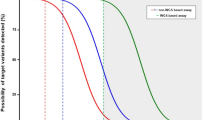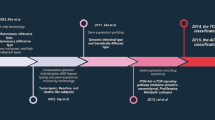Abstract
As the prognosis of colorectal cancer (CRC) does not always coincide with the pathology and/or surgical findings, a reliable noninvasive prediction tool for the prognosis of CRC is needed. Patients admitted for initial treatment of CRC between January 1, 2015 and December 31, 2015 were retrieved and reviewed. Records of circulating CD16+ CD56+ natural killer (NK) cells were analyzed before and after the initial chemotherapy of FOLFOX plan. Patients were followed up until June 30, 2019. One hundred and twenty-four cases after the FOLFOX chemotherapy were enrolled into this study. There were no significant differences in gender, age, or number of metastasis cases between the survival group and the nonsurvival group (p > 0.05), but significant differences in pre-chemotherapy, post-chemotherapy, and the differences between pre- and post-chemotherapy circulating CD16+ CD56+ NK cells between the survival group and the nonsurvival group (p < 0.01, p < 0.01, and p < 0.05, respectively) were observed. For the prediction of survival and nonsurvival CRC cases, the Areas Under the Curve were 0.626 and 0.759 in the Receiver-Operating Characteristic curves for the pre- and post-chemotherapy circulating CD16+ CD56+NK cells, respectively. Using an optimal cutoff value of 11.8% in post-chemotherapy circulating CD16+CD56+NK cells to differentiate survival and nonsurvival cases, the odds ratio was 0.12 (0.05, 0.27), p < 0.001. The percentages of both pre-chemotherapy and post-chemotherapy circulating CD16+CD56+NK cells were negatively correlated with the prognosis of CRC. The percentage of post-chemotherapy circulating CD16+CD56+NK cells was able to effectively predict the prognosis of CRC cases.



Similar content being viewed by others
Data availability
Original data could be obtained by contacting the corresponding author.
References
Torre LA, Bray F, Siegel RL, Ferlay J, Lortet-Tieulent J, Jemal A. Global cancer statistics, 2012. CA Cancer J Clin. 2015;65(2):87–108.
Brody H. Colorectal cancer. Nature. 2015;521(7551):S1.
Van Cutsem E, Cervantes A, Nordlinger B, Arnold D, ESMO Guidelines Working Group. Metastatic colorectal cancer: ESMO Clinical Practice Guidelines for diagnosis, treatment and follow-up. Ann Oncol. 2014;25(Suppl 3):1–9.
Galon J, Costes A, Sanchez-Cabo F, et al. Type, density, and location of immune cells within human colorectal tumors predict clinical outcome. Science. 2006;313(5795):1960–4.
Peparini N, Beyond T. N and M: the impact of tumor deposits on the staging and treatment of colorectal and gastric carcinoma. Surg Oncol. 2018;27(2):129–37.
Mlecnik B, Marliot F, Bindea G, et al. International validation of the consensus immunoscore for the classification of colon cancer: a prognostic and accuracy study. Lancet. 2018;391(10135):2128–39.
Pawa N, Arulampalam T, Norton JD. Screening for colorectal cancer: established and emerging modalities. Nat Rev Gastroenterol Hepatol. 2011;8(12):711–22.
Pagès F, Kirilovsky A, Mlecnik B, et al. In situ cytotoxic and memory T cells predict outcome in patients with early-stage colorectal cancer”. J Clin Oncol. 2009;27(35):5944–51.
Pagès F, Berger A, Camus M, et al. Effector memory T cells, early metastasis, and survival in colorectal cancer. N Engl J Med. 2005;353(25):2654–66.
Rocca YS, Roberti MP, Arriaga JM, et al. Altered phenotype in peripheral blood and tumorassociated NK cells from colorectal cancer patients. Innate Immun. 2013;19(1):76–85.
Chen ZY, Raghav K, Lieu CH, et al. Cytokine profile and prognostic significance of high neutrophil-lymphocyte ratio in colorectal cancer. Br J Cancer. 2015;112(6):1088–97.
Biassoni R, Cantoni C, Pende D, et al. Human natural killer cell receptors and co-receptors. Immunol Rev. 2001;181:203–14.
Benson AB, Venook AP, Al-Hawary MM, et al. NCCN Guidelines Insights Colon Cancer, Version 2.2018. J Natl Compr Canc Netw. 2018;16(4):359–369.
Cooper MA, Fehniger TA, Caligiuri MA. The biology of human natural killer-cell subsets. Trends Immunol. 2001;22(11):633–40.
Dutertre CA, Bonnin-Gelize E, Pulford K, Bourel D, Fridman WH, Teillaud JL. A novel subset of NK cells expressing high levels of inhibitory FcgammaRIIB modulating antibodydependent function. J Leukoc Biol. 2008;84(6):1511–20.
Bendelac A, Savage PB, Teyton L. The biology of NKT cells. Annu Rev Immunol. 2007;25:297–336.
Xiong Y, Wang K, Zhou H, Peng L, You W, Fu Z. Profiles of immune infiltration in colorectal cancer and their clinical significant: a gene expression-based study. Cancer Med. 2018;7(9):4496–508.
Okada K, Sadahiro S, Chan LF, Ogimi T, Miyakita H, Saito G, Tanaka A, Suzuki T. The number of natural killer cells in the largest diameter lymph nodes is associated with the number of retrieved lymph nodes and lymph node size, and is an independent prognostic factor in patients with stage II colon cancer. Oncology. 2018;95(5):288–96.
Spacek J, Vocka M, Netikova I, Skalova H, Dundr P, Konopasek B, Zavadova E, Lubos P. Immunological examination of peripheral blood in patients with colorectal cancer compared to healthy controls. Immunol Invest. 2018;47(7):643–53.
Krijgsman D, de Vries NL, Skovbo A, et al. Characterization of circulating T-, NK-, and NKT cell subsets in patients with colorectal cancer: the peripheral blood immune cell profile. Cancer Immunol Immunother. 2019;68(6):1011–24.
Wang Y, Sun J, Gao W, et al. Preoperative Tim-3 expression on peripheral NK cells is correlated with pathologic TNM staging in colorectal cancer. Mol Med Rep. 2017;15(6):3810–8.
Brandstadter JD, Yang Y. Natural killer cell responses to viral infection. J Innate Immun. 2011;3(3):274–9.
Brown MG, Dokun AO, Heusel JW, et al. Vital involvement of a natural killer cell activation receptor in resistance to viral infection. Science. 2001;292(5518):934–7.
Khakoo SI, Carrington M. KIR and disease: a model system or system of models? Immunol Rev. 2006;214:186–201.
Stewart CA, Laugier-Anfossi F, Vely F, et al. Recognition of peptide-MHC class I complexes by activating killer immunoglobulin-like receptors. Proc Natl Acad Sci USA. 2005;102(37):13224–9.
Moretta L, Ciccone E, Mingar MC, Biassoni R, Moretta A. Human natural killer cells: origin, clonality, specificity, and receptors. Adv Immunol. 1994;55:341–80.
Wagtmann N, Rajagopalan S, Winter CC, Peruzzi M, Long EO. Killer cell inhibitory receptors specific for HLA-C and HLA-B identified by direct binding and by functional transfer. Immunity. 1995;3(6):801–9.
Megías J, Yáñez A, Moriano S, O’Connor JE, Gozalbo D, Gil ML. Direct Toll-like receptor-mediated stimulation of hematopoietic stem and progenitor cells occurs in vivo and promotes differentiation toward macrophages. Stem Cells. 2012;30(7):1486–95.
Li K, Li L, Wu X, et al. Loss of SDC1 expression is associated with poor prognosis of colorectal cancer patients in Northern China. Dis Markers. 2019;2019:3768708.
Zhou Z, Ma X, Wang F, Sun L, Zhang G. A matrix metalloproteinase-1 polymorphism, MMP1-1607 (1G > 2G), is associated with increased cancer risk: a meta-analysis including 21,327 patients. Dis Markers. 2018;2018:7565834.
Zhang L, Yang Y, Cheng L, Cheng Y, Zhou HH, Tan ZR. Identification of common genes refers to colorectal carcinogenesis with paired cancer and noncancer samples. Dis Markers. 2018;2018:3452739.
Liu Z, Wu S, Wang L, et al. Prognostic value of MicroRNA-497 in various cancers: a systematic review and meta-analysis. Dis Markers. 2019;2019:2491291.
Chen Y, Wang Z, Zhao G, et al. Performance of a novel blood-based early colorectal cancer screening assay in remaining serum after the blood biochemical test. Dis Markers. 2019;2019:5232780.
Gu J, Xiao Y, Shu D, et al. Metabolomics analysis in serum from patients with colorectal polyp and colorectal cancer by 1H-NMR spectrometry. Dis Markers. 2019;2019:3491852.
Funding
None.
Author information
Authors and Affiliations
Corresponding author
Ethics declarations
Conflict of interest
All the authors declare there are no conflicts of interest involved in the submission of this manuscript, and the manuscript has been approved by all authors for publication.
Additional information
Publisher's Note
Springer Nature remains neutral with regard to jurisdictional claims in published maps and institutional affiliations.
Rights and permissions
About this article
Cite this article
Cui, F., Qu, D., Sun, R. et al. Circulating CD16+CD56+ nature killer cells indicate the prognosis of colorectal cancer after initial chemotherapy. Med Oncol 36, 84 (2019). https://doi.org/10.1007/s12032-019-1307-8
Received:
Accepted:
Published:
DOI: https://doi.org/10.1007/s12032-019-1307-8




